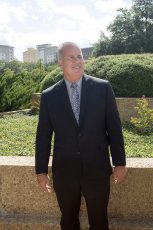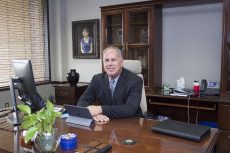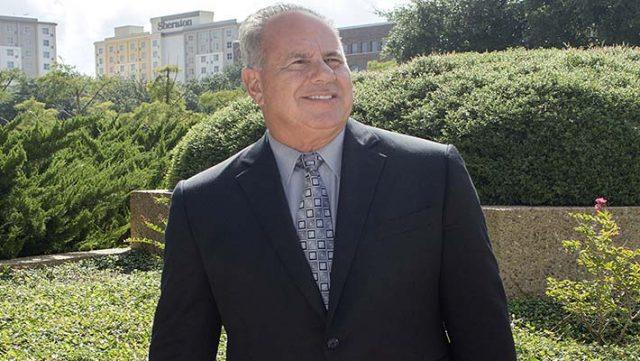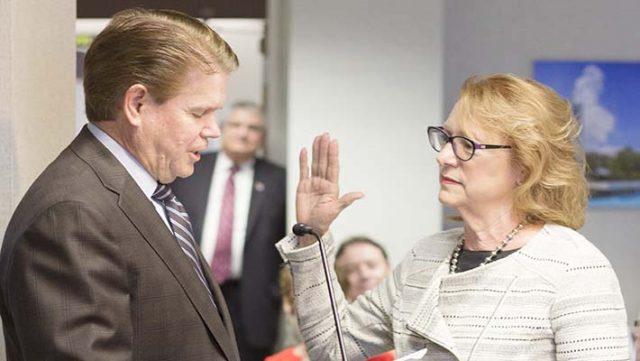By Jamil Oakford/ editor-in-chief

Bogdan Sierra Miranda/The Collegian
In a hotel room at the beginning of the Texas summer, an eager family huddled around a screen and waited with buzzing enthusiasm for news.
Eugene Giovannini tuned in to watch the special board of trustees meeting conducted in early June to announce which of the two finalists would become TCC’s new chancellor.
In a process that Giovannini described as dating and finding that he and TCC were a great match the further along he made it, he felt strongly invested in this particular moment.
And sometime after 6 p.m. June 9, Giovannini was named the new chancellor.
As Giovannini reflects on that process, TCC was a match because both he and the college seemed to put emphasis in the same area: student success.
“The Super Bowl for college is graduation day,” he said. “Everything leading up to that is very important.”
During his first week as chancellor, Giovannini spoke about his past, reminisced about the hiring process and provided his expectations for the college.
Reared in the Finger Lakes region of upstate New York, it wasn’t until he reached the tail end of his undergraduate work at Bloomsberg University in Pennsylvania that he would focus more on education.
“I was about ready to graduate, and the dean of the school of business called and said, ‘How would you like to go to graduate school?’” Giovannini said.
While he hadn’t thought about it before that point, he ultimately chose to go through the master’s program at Virginia Tech University.

Bogdan Sierra Miranda/The Collegian
During his education, he worked closely with the business division dean. He attributes his work during this time as his first taste into the administrative workings of a university.
After that, Giovannini went into teaching. He taught at his former high school, then the rival to his former high school and a community college.
“I always had that work in the back of my head, that type of work, I really enjoyed it,” he said.
This experience, along with work at state colleges and research universities, on his application was reassuring from the start, according to board president Louise Appleman.
“To me, he’s an educator,” she said. “He’s been a campus administrator for 11 years, but he continued to teach classes.”
Giovannini comes to TCC from Maricopa Community College in Scottsdale, Arizona. There, he served as the founding president of Maricopa’s Corporate College and also served as president of Gateway Community College in Phoenix.
“He’s a very innovative thinker,” said Patti O’Brien, Maricopa’s marketing and public relations director. “He has a great vision of where the future is for education.”
She said her former campus president getting the new position was great news but also hard to take.
“It was a pleasure to work with him,” O’Brien said. “We’ll miss him here at Maricopa.”
While at Maricopa, Giovannini did something that thoroughly impressed Appleman and the board.
The college wasn’t receiving much state funding, so Giovannini suggested to the chancellor that the school seek funding from outside businesses to give them workforce training.
And with the diminishing state funding at TCC, the need for new ways to fund the college was a factor in the search for the right fit, Appleman said.
“When I started on the board, we were receiving state funding somewhere around 70 percent,” she said. “Now we receive 17 percent.”
While his ability to create partnerships with community businesses is there, his passion resides in the work he can do at the community college level, he said.
“The one [teaching job] that was the most fulfilling was the community college,” he said. “There, you can actually see the fruits of your labor.”
While teaching at a community college in New Jersey, 20 miles from the Ivy League Princeton University, he recognized something unique to the work he was doing.
“I would tell the staff, ‘Those faculty, those folks down the street at Princeton, it doesn’t really make a difference —’ exaggerating a little bit, ‘those students are going to learn no matter what,’” he said. “What we do at community college grassroots, we change lives — in some cases, save lives.”
Working with a variety of students who are first generation or trying to make sense of college-level work was where the real work started for him, he said.
“You can really see the change that you actually produce or help students achieve more so than at a state college or research university,” Giovannini said. “Not that they’re not doing a good job, but this was much more rewarding and personally fulfilling.”
O’Brien said she enjoyed her time working with Giovannini and wishes him well as he starts this new chapter.
“I only hope he could inspire as many people in Tarrant County as he did here at Maricopa,” she said.
When it comes down to his expectations for his time here at TCC, he said he’s expecting to learn a lot more so that he can gauge the direction for the college’s future. But he doesn’t plan to do this alone.
He said he wanted to bring “together the college community to assess what those needs are and addressing those.”
Keeping that all in mind, Giovannini moves forward as TCC’s new chancellor. He realizes the intrinsically powerful connection between students and the college.
“We wouldn’t be here without students. We exist solely for them,” he said. “Often times, you’ll hear colleges saying, ‘Are students college-ready?’ I would like to turn that around and have our students ask, ‘Is that college student-ready?’”





























